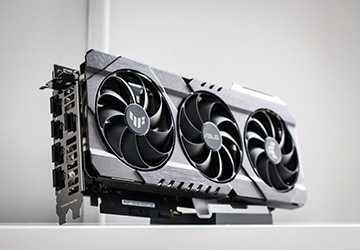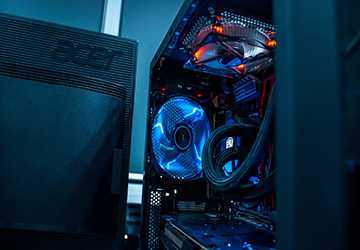Guide to Building Your Gaming PC
Blueprint: Research and Budget Planning
Before you start selecting gaming computer components, it's essential to take the time to research and budget. The DIY approach offers flexibility in terms of performance and price. Unlike pre-built systems, DIY gaming PCs can be assembled based on your investment desires and performance levels. Spend time browsing online forums, reading reviews, and watching tutorials on how to build a gaming PC. These initial basics will pave the way for a smoother construction process and help you avoid costly mistakes.
Key takeaway: Choose the right CPU and motherboard
Regarding gaming PC components, the central processing unit (CPU) and motherboard are the system's backbone. The CPU is responsible for all data processing in the computer. Therefore, if you choose a powerful CPU, you can significantly improve your gaming experience. The motherboard acts as the main circuit board that connects all the components. Ensure your motherboard is compatible with your chosen CPU and has room for future upgrades. Choosing wisely will lay the foundation for all the other gaming PC components you'll add.

Visual Effects: Graphics Card and Monitor Selection
For those who want to game at high resolutions or frame rates, a graphics processing unit (GPU) is crucial. This gaming PC component directly affects your visual experience. You can choose a mid-range graphics card or a high-end model, depending on your gaming needs. To complement your GPU, you'll need a powerful monitor that can recreate the graphics performance of a DIY gaming PC. Look for a monitor with fast refresh rates and low latency for the best gaming experience.
Storage: SSD or HDD? That's the problem.
In modern gaming setups, your chosen storage type can significantly impact load times and game performance. Solid-state drives (SSDs) are quickly becoming the standard and replacing hard disk drives (HDDs) due to their speed and reliability. However, SSDs are generally more expensive. To achieve balance, many people install their operating system and essential games on an SSD while using a hard drive for additional storage.
Endurance: Power and Cooling System
Often overlooked, a gaming PC's power supply unit (PSU) and cooling system are essential components. They may not directly impact your FPS numbers, but they will ensure that your DIY gaming PC runs efficiently and stays cool during intense gaming sessions. Always choose a power supply from a reputable manufacturer and ensure it provides more power than your system needs. Equally important are cooling solutions, which range from air cooling to more advanced liquid cooling systems.
Software: Choosing the right operating system
It's easy to overlook software when you're busy choosing the perfect hardware, but the operating system you choose will play a significant role in your DIY gaming PC experience. While Windows remains the first choice for most gamers due to its compatibility with games and peripherals, Linux is also an attractive and cost-effective alternative. Whatever you choose, make sure it's suitable for the games you like and the gaming PC components you choose.
Networking nuances: Don't skimp on your connections
Online gaming requires a fast and reliable internet connection. This is especially true for games that require low latency. So, when considering how to build a gaming PC, consider your networking hardware. A high-quality network card, an efficient router, and even game-specific quality of service settings can significantly impact your online gaming experience. These may not be traditional gaming PC components, but they're just as important.

Facing the future: investing in longevity
Any discussion of how to build a gaming PC will end with future-proof concepts. Technology is constantly changing, and next year's mid-range products may surpass today's high-end components. Therefore, it makes sense to choose parts that offer more features than you currently need to ensure your system remains relevant for longer. This applies to all your gaming PC components.
Community and Support: Why you're never alone
One of the most underrated aspects of building a DIY gaming computer is the support and growing community of other builders. Online forums, social media groups, and local meetups provide information, guidance, and moral support. Remember how valuable a second opinion or fresh perspective can be when you feel overwhelmed by gaming PC components and guides.
Comprehensive Endurance Section: Why Power and Cooling Are Not Afterthoughts
Last is the power supply unit (PSU) and cooling system. These gaming PC components may not directly impact your gaming performance, but they will ensure that your DIY gaming PC runs efficiently and stays quiet even under heavy workloads. A high-quality power supply from a well-known manufacturer ensures a stable power supply, while a powerful cooling system (either air or liquid cooling) ensures thermal efficiency. Investing in these components can extend the life and reliability of your gaming setup.
Final Step: Aesthetic and Functional Adjustments
Once you've got the technical aspects, you can focus on aesthetics and additional functionality. Your options are endless, from RGB lighting to dedicated gaming keyboards and mice. One of the main benefits of knowing how to build a gaming PC is the personalization aspect. Make it your own.
As you use this detailed guide to build your DIY gaming PC, remember that the process is as much about the journey as the destination. A wide range of gaming PC component options enable you to create a system that meets your performance needs and reflects your style. Whether you're a seasoned tech enthusiast or new to DIY gaming PCs, this guide is designed to give you the knowledge you need to build your dream gaming setup.
Related Posts
- How to Choose the Right Processor for Your Computing Needs?
- USB-C: The Future of Connectivity
- What to Look for in Gaming Monitors for Professional Gamers?
- The Top 10 Machine Learning Libraries Transforming Data Science in IT
- When to Upgrade Your Smartphone for Maximum Efficiency
- Essential Software for New Computer Users